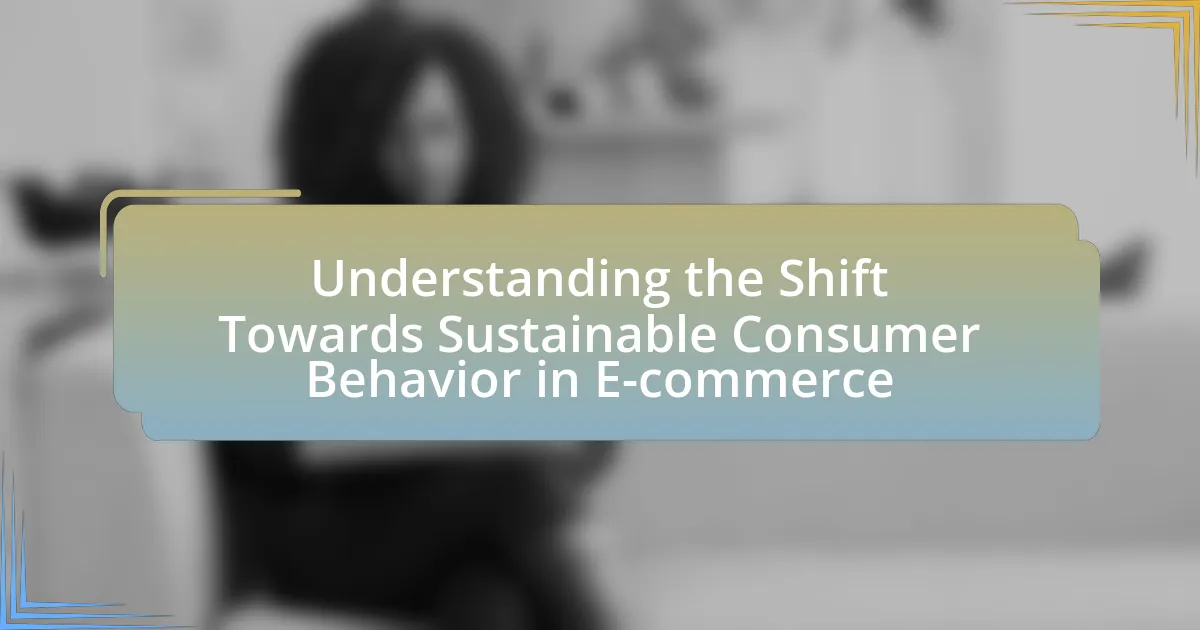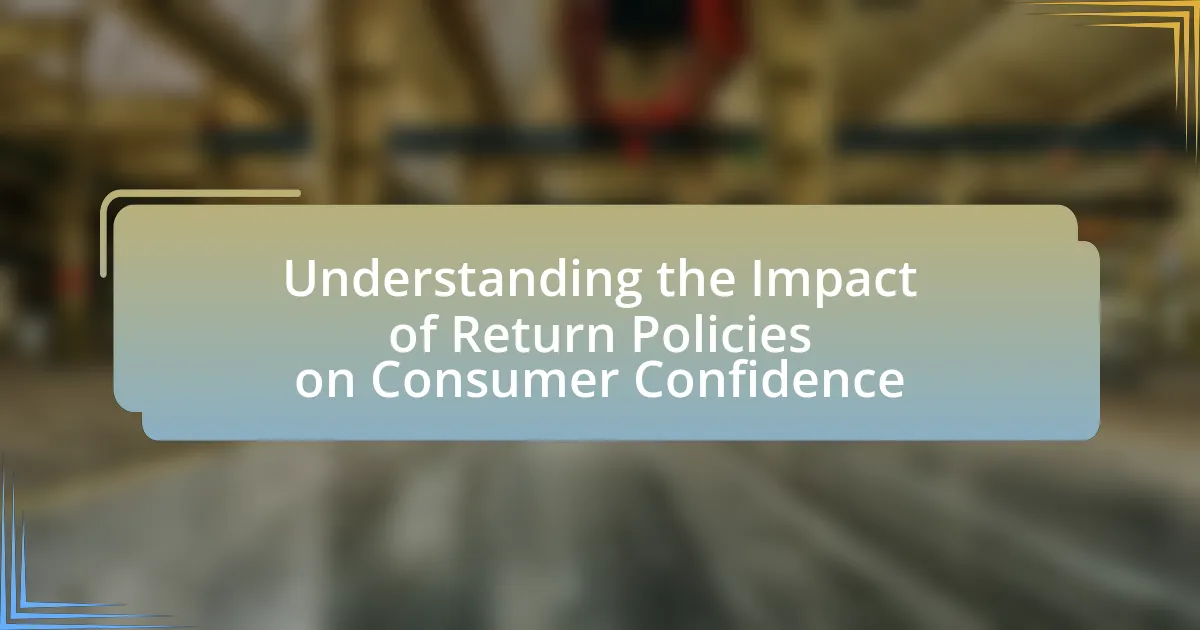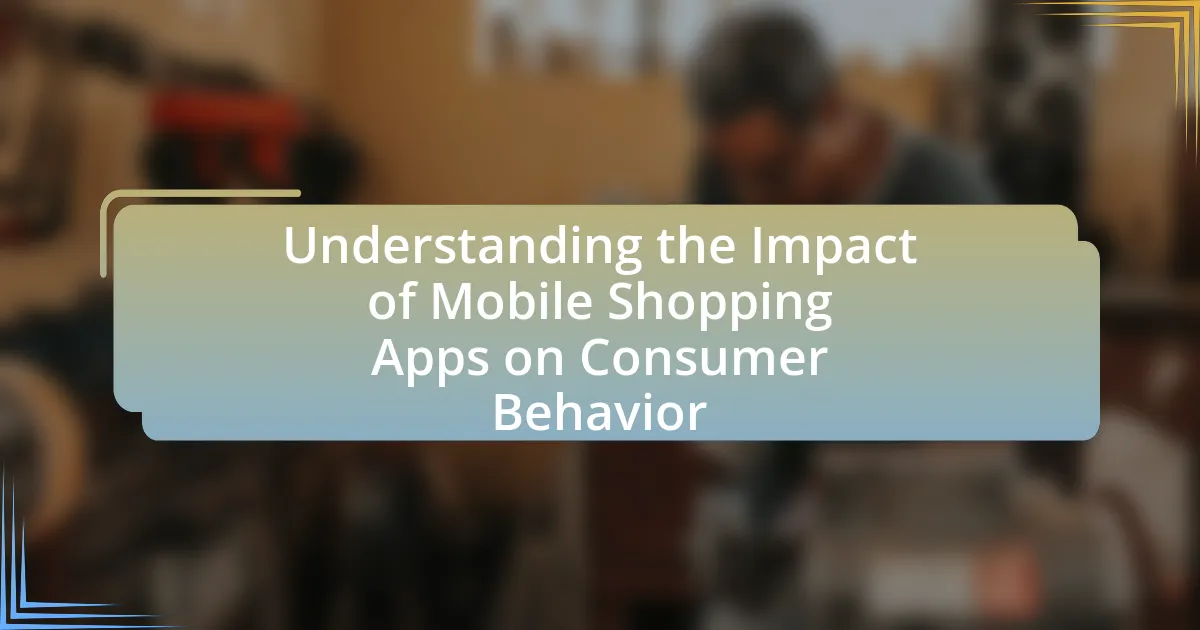The article examines how global events, such as economic crises, pandemics, and natural disasters, significantly influence consumer behavior in e-commerce. It highlights the shifts in purchasing priorities, increased price sensitivity, and the psychological effects of uncertainty that drive changes in consumer spending habits. Key findings include the surge in online shopping during the COVID-19 pandemic, the impact of economic downturns on consumer preferences for essential goods, and the importance of understanding these behavioral changes for e-commerce businesses. The article also discusses strategies for businesses to adapt to these shifts, including leveraging data analytics and targeted marketing campaigns to enhance consumer engagement and maintain trust during challenging times.

How do global events influence consumer behavior in e-commerce?
Global events significantly influence consumer behavior in e-commerce by altering purchasing priorities and driving shifts in demand. For instance, during the COVID-19 pandemic, online shopping surged as consumers sought convenience and safety, leading to a 44% increase in e-commerce sales in the U.S. in 2020, according to the U.S. Department of Commerce. Additionally, global events such as economic downturns or geopolitical tensions can lead to increased price sensitivity, prompting consumers to seek discounts and value-driven purchases. This behavior is evidenced by a 2021 McKinsey report indicating that 75% of consumers tried new shopping behaviors during the pandemic, many of which persisted post-crisis. Thus, global events create immediate and lasting changes in consumer preferences and behaviors in the e-commerce landscape.
What types of global events impact e-commerce consumer behavior?
Global events that impact e-commerce consumer behavior include economic crises, pandemics, natural disasters, and geopolitical tensions. Economic crises, such as the 2008 financial downturn, lead to reduced consumer spending and shifts in purchasing priorities. The COVID-19 pandemic significantly accelerated online shopping trends, with a 44% increase in e-commerce sales in the U.S. in 2020 compared to the previous year. Natural disasters, like hurricanes or earthquakes, can disrupt supply chains and influence consumer urgency for essential goods. Geopolitical tensions, such as trade wars, can affect product availability and pricing, altering consumer purchasing decisions. These events collectively shape how consumers engage with e-commerce platforms.
How do economic crises affect online shopping trends?
Economic crises typically lead to a shift in online shopping trends, characterized by increased price sensitivity and a focus on essential goods. During economic downturns, consumers often prioritize necessities over luxury items, resulting in a rise in demand for budget-friendly products and discount retailers. For instance, a study by the National Retail Federation indicated that during the 2008 financial crisis, online sales of essential goods surged while discretionary spending declined. Additionally, consumers may turn to online shopping as a means to compare prices easily and find better deals, further influencing their purchasing behavior during economic uncertainty.
What role do natural disasters play in shaping consumer purchasing decisions?
Natural disasters significantly influence consumer purchasing decisions by altering priorities and increasing demand for specific products. For instance, during events like hurricanes or floods, consumers tend to prioritize essential items such as food, water, and emergency supplies, leading to spikes in sales for these categories. Research conducted by the National Retail Federation indicates that in the aftermath of disasters, spending on home improvement and emergency preparedness items can increase by over 30%. This shift in purchasing behavior reflects a direct response to immediate needs and safety concerns, demonstrating how natural disasters can reshape consumer priorities and spending patterns in e-commerce.
Why is understanding consumer behavior during global events crucial for e-commerce businesses?
Understanding consumer behavior during global events is crucial for e-commerce businesses because it directly influences purchasing decisions and market trends. For instance, during the COVID-19 pandemic, e-commerce sales surged by 44% in 2020, highlighting how global crises can shift consumer priorities towards online shopping. This shift necessitates that e-commerce businesses adapt their strategies to meet changing consumer needs, such as increased demand for essential goods and contactless delivery options. By analyzing consumer behavior during these events, businesses can optimize their marketing efforts, inventory management, and customer engagement strategies, ultimately enhancing their competitiveness and profitability in a rapidly evolving market.
How can businesses adapt their strategies based on consumer behavior changes?
Businesses can adapt their strategies based on consumer behavior changes by leveraging data analytics to identify trends and preferences. For instance, during the COVID-19 pandemic, many companies shifted to online platforms as consumer purchasing behavior moved towards e-commerce, with a reported 44% increase in online spending in 2020 according to Adobe Analytics. By analyzing this data, businesses can tailor their marketing efforts, optimize their product offerings, and enhance customer experiences to align with evolving consumer expectations. This approach not only addresses immediate shifts in behavior but also positions businesses to anticipate future trends, ensuring sustained relevance in a dynamic market.
What are the potential risks of ignoring shifts in consumer behavior during global events?
Ignoring shifts in consumer behavior during global events can lead to significant financial losses and brand damage. For instance, during the COVID-19 pandemic, many retailers that failed to adapt to the surge in online shopping experienced a decline in sales, with e-commerce sales increasing by 44% in 2020 compared to the previous year. Additionally, neglecting these shifts can result in misaligned marketing strategies, leading to wasted resources and missed opportunities to engage with consumers effectively. Companies that do not respond to changing consumer preferences risk losing market share to competitors who are more attuned to the evolving landscape.

What are the psychological effects of global events on consumers in e-commerce?
Global events significantly impact consumers’ psychological states in e-commerce, leading to changes in purchasing behavior, emotional responses, and decision-making processes. For instance, during crises such as the COVID-19 pandemic, consumers experienced heightened anxiety and uncertainty, which drove an increase in online shopping as a coping mechanism. Research indicates that 75% of consumers reported feeling more anxious about their financial situation during global crises, influencing their spending habits and prioritization of essential goods over luxury items. Additionally, global events can create a sense of urgency or scarcity, prompting consumers to make quicker purchasing decisions due to fear of missing out. This psychological response is supported by studies showing that limited-time offers and stock shortages can lead to a 30% increase in conversion rates in e-commerce platforms.
How do global events alter consumer priorities and spending habits?
Global events significantly alter consumer priorities and spending habits by shifting focus towards essential goods and services during crises. For instance, during the COVID-19 pandemic, consumers prioritized health-related products, home entertainment, and online shopping, leading to a 44% increase in e-commerce sales in 2020, according to the U.S. Department of Commerce. Additionally, economic uncertainty often results in consumers adopting more frugal spending behaviors, as seen during the 2008 financial crisis when discretionary spending dropped by 10%. These shifts illustrate how global events directly influence consumer behavior, prompting changes in purchasing priorities and spending patterns.
What psychological factors drive changes in consumer behavior during crises?
Psychological factors that drive changes in consumer behavior during crises include fear, uncertainty, and social influence. Fear often leads consumers to prioritize essential goods and services, as seen during the COVID-19 pandemic when panic buying occurred for items like toilet paper and hand sanitizer. Uncertainty about the future can cause consumers to adopt a more cautious approach, reducing discretionary spending and shifting focus to savings. Social influence plays a significant role as individuals look to peers and media for cues on acceptable behavior, which can lead to trends such as increased online shopping for safety reasons. Research by the Journal of Consumer Research indicates that these psychological factors significantly alter purchasing patterns during crises, highlighting the importance of understanding consumer behavior in such contexts.
How does fear or uncertainty influence online purchasing decisions?
Fear and uncertainty significantly influence online purchasing decisions by causing consumers to hesitate or abandon their carts. Research indicates that during times of crisis, such as economic downturns or global pandemics, consumers exhibit increased anxiety, leading to a preference for essential goods over discretionary items. For instance, a study by the National Retail Federation found that 60% of consumers reported feeling uncertain about their financial situation during the COVID-19 pandemic, which directly impacted their spending habits. This heightened fear often results in consumers seeking reassurance through reviews, return policies, and brand trust, ultimately affecting their purchasing behavior.
What strategies can e-commerce businesses employ to address these psychological effects?
E-commerce businesses can employ strategies such as personalized marketing, social proof, and enhanced customer support to address psychological effects stemming from global events. Personalized marketing leverages consumer data to tailor recommendations, which can increase engagement and reduce anxiety by making shopping feel more relevant and secure. Social proof, such as customer reviews and testimonials, can alleviate uncertainty by showcasing positive experiences from others, thereby building trust. Enhanced customer support, including live chat options and responsive service, can provide reassurance and immediate assistance, addressing concerns that may arise during stressful times. These strategies are effective as they directly respond to consumer needs for connection, validation, and support, which are heightened during global events.
How can targeted marketing campaigns mitigate negative consumer sentiments?
Targeted marketing campaigns can mitigate negative consumer sentiments by addressing specific concerns and preferences of the audience. By utilizing data analytics, businesses can identify the sentiments and behaviors of consumers, allowing them to tailor messages that resonate positively. For instance, during economic downturns, brands that emphasize value and affordability in their campaigns can alleviate consumer anxiety, as evidenced by a study from McKinsey which found that 75% of consumers are more likely to engage with brands that demonstrate empathy during challenging times. This strategic alignment with consumer emotions fosters trust and loyalty, effectively transforming negative perceptions into positive engagement.
What role does customer support play in maintaining consumer trust during global events?
Customer support plays a critical role in maintaining consumer trust during global events by providing timely and accurate information, addressing concerns, and demonstrating empathy. During crises, consumers often seek reassurance and clarity regarding their purchases and services, making responsive customer support essential. For instance, a study by Zendesk found that 82% of consumers feel more positive about a brand after receiving a quick response from customer support. This responsiveness helps to alleviate anxiety and uncertainty, reinforcing trust in the brand. Additionally, effective customer support can mitigate negative experiences, as seen during the COVID-19 pandemic when companies that communicated transparently about delays and safety measures were able to retain customer loyalty.

How can e-commerce businesses leverage global events to enhance consumer engagement?
E-commerce businesses can leverage global events by creating targeted marketing campaigns that resonate with current consumer sentiments and interests. For instance, during major sporting events like the FIFA World Cup, brands can launch promotions tied to the event, such as themed merchandise or limited-time discounts, which can increase engagement by appealing to the emotions and excitement surrounding the event. Research shows that 70% of consumers are more likely to engage with brands that align their messaging with relevant cultural moments, indicating that timely and relevant marketing can significantly enhance consumer interaction and loyalty.
What are effective marketing strategies during global events?
Effective marketing strategies during global events include leveraging real-time engagement, utilizing social media platforms, and creating tailored content that resonates with the event’s theme. Real-time engagement allows brands to connect with audiences instantly, as seen during the 2020 Tokyo Olympics, where brands like Coca-Cola used live updates and interactive content to enhance viewer experience. Social media platforms serve as powerful tools for reaching large audiences; for instance, during the COVID-19 pandemic, brands that adapted their messaging to reflect empathy and support saw increased consumer loyalty. Tailored content that aligns with the global event’s significance can drive higher engagement rates, as evidenced by brands that created campaigns around the FIFA World Cup, which often see spikes in consumer interaction and sales.
How can businesses create relevant content that resonates with consumers during crises?
Businesses can create relevant content that resonates with consumers during crises by prioritizing empathy, transparency, and timely communication. Empathy involves understanding the emotional state of consumers and addressing their concerns directly, which can be achieved through relatable messaging and supportive language. Transparency is crucial; businesses should openly share how they are responding to the crisis, including any changes in operations or policies. Timely communication ensures that content is relevant to the current situation, allowing businesses to provide updates and resources that consumers may need. For example, during the COVID-19 pandemic, brands that communicated safety measures and offered support saw increased consumer trust and engagement, as evidenced by a McKinsey report indicating that 75% of consumers preferred brands that demonstrated social responsibility during the crisis.
What promotional tactics can be employed to boost sales during challenging times?
Promotional tactics that can be employed to boost sales during challenging times include offering discounts, implementing loyalty programs, and utilizing targeted marketing campaigns. Discounts can attract price-sensitive consumers, as evidenced by a study from the Journal of Marketing Research, which found that 70% of consumers are more likely to purchase during a sale. Loyalty programs incentivize repeat purchases, with research from the Harvard Business Review indicating that increasing customer retention by just 5% can boost profits by 25% to 95%. Targeted marketing campaigns, particularly through social media, can effectively reach specific demographics, as data from Statista shows that 54% of consumers prefer personalized ads. These tactics collectively enhance consumer engagement and drive sales during economic downturns.
How can data analytics help in understanding consumer behavior shifts during global events?
Data analytics can significantly enhance the understanding of consumer behavior shifts during global events by providing insights into purchasing patterns, preferences, and sentiment changes. For instance, during the COVID-19 pandemic, data analytics revealed a surge in online shopping and a shift towards essential goods, as consumers adapted to lockdown measures. According to a McKinsey report, e-commerce penetration in the U.S. jumped from 16% to 27% in just a few months, illustrating how analytics can track and quantify these rapid changes. By analyzing data from various sources, such as sales figures, social media trends, and customer feedback, businesses can identify emerging consumer needs and adjust their strategies accordingly. This data-driven approach allows companies to respond proactively to shifts in consumer behavior, ensuring they remain relevant and competitive during global events.
What metrics should businesses focus on to gauge consumer response effectively?
Businesses should focus on metrics such as customer satisfaction scores, Net Promoter Score (NPS), conversion rates, and engagement metrics to gauge consumer response effectively. Customer satisfaction scores provide direct feedback on consumer experiences, while NPS measures the likelihood of customers recommending a brand, indicating overall loyalty. Conversion rates reflect the effectiveness of marketing strategies in turning potential customers into buyers, and engagement metrics, such as click-through rates and time spent on site, reveal how well consumers interact with content. These metrics collectively offer a comprehensive view of consumer sentiment and behavior, enabling businesses to adapt strategies in response to global events impacting e-commerce.
How can predictive analytics inform future e-commerce strategies based on past global events?
Predictive analytics can inform future e-commerce strategies by analyzing consumer behavior patterns that emerged during past global events, such as economic downturns or pandemics. For instance, during the COVID-19 pandemic, e-commerce saw a significant shift towards online shopping, with a 44% increase in online sales in 2020 compared to the previous year, according to the U.S. Department of Commerce. By leveraging this data, e-commerce businesses can anticipate shifts in consumer preferences, optimize inventory management, and tailor marketing strategies to align with emerging trends. This approach allows companies to proactively adapt to changing market conditions, ensuring they meet consumer demands effectively.
What best practices should e-commerce businesses follow during global events?
E-commerce businesses should prioritize clear communication, adaptability, and customer support during global events. Clear communication involves updating customers about changes in shipping, inventory, and policies, which helps maintain trust and transparency. Adaptability is crucial; businesses must be ready to pivot their strategies based on shifting consumer needs and market conditions, as seen during the COVID-19 pandemic when many companies successfully transitioned to online sales. Enhanced customer support, including extended service hours and responsive channels, ensures that customer inquiries and concerns are addressed promptly, fostering loyalty. These practices are supported by research indicating that effective communication and customer engagement significantly influence consumer trust and purchasing decisions during crises.





